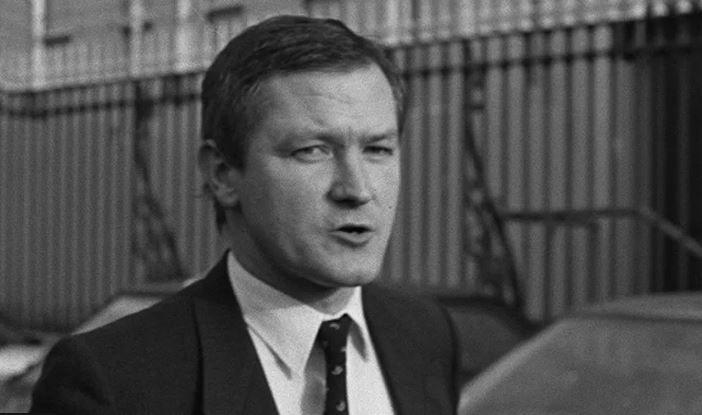Finucane's fight for public inquiry 'a long journey'
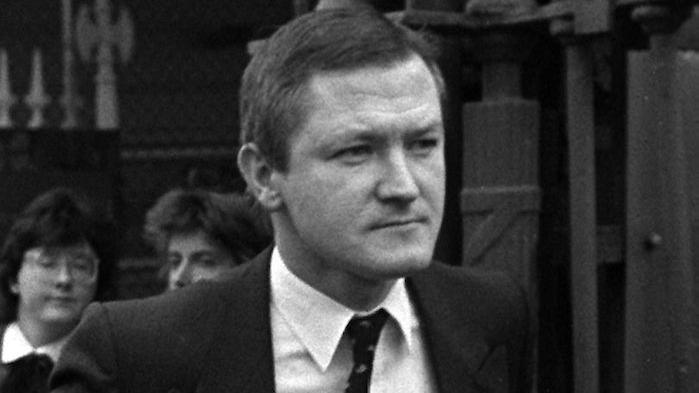
The 39-year-old solicitor was shot dead at his home in Belfast in 1989
- Published
An independent public inquiry has been ordered into the murder of Belfast solicitor Pat Finucane in 1989.
The 39-year-old was shot at his home in Belfast by loyalist paramilitaries in front of his wife and children.
Several examinations of the case have found evidence of state collusion in the killing.
His wife Geraldine Finucane, who was also wounded in the attack, said her family's fight to secure an independent public inquiry had been a "long journey".
The Northern Ireland Secretary Hilary Benn said that the "exceptional reason" of outstanding and unfulfilled commitments by previous UK governments to establish a public inquiry meant it should proceed.
Benn met members of the Finucane family on Tuesday, when it is believed he informed them of the decision.
Killing not 'simply the act of gunmen'
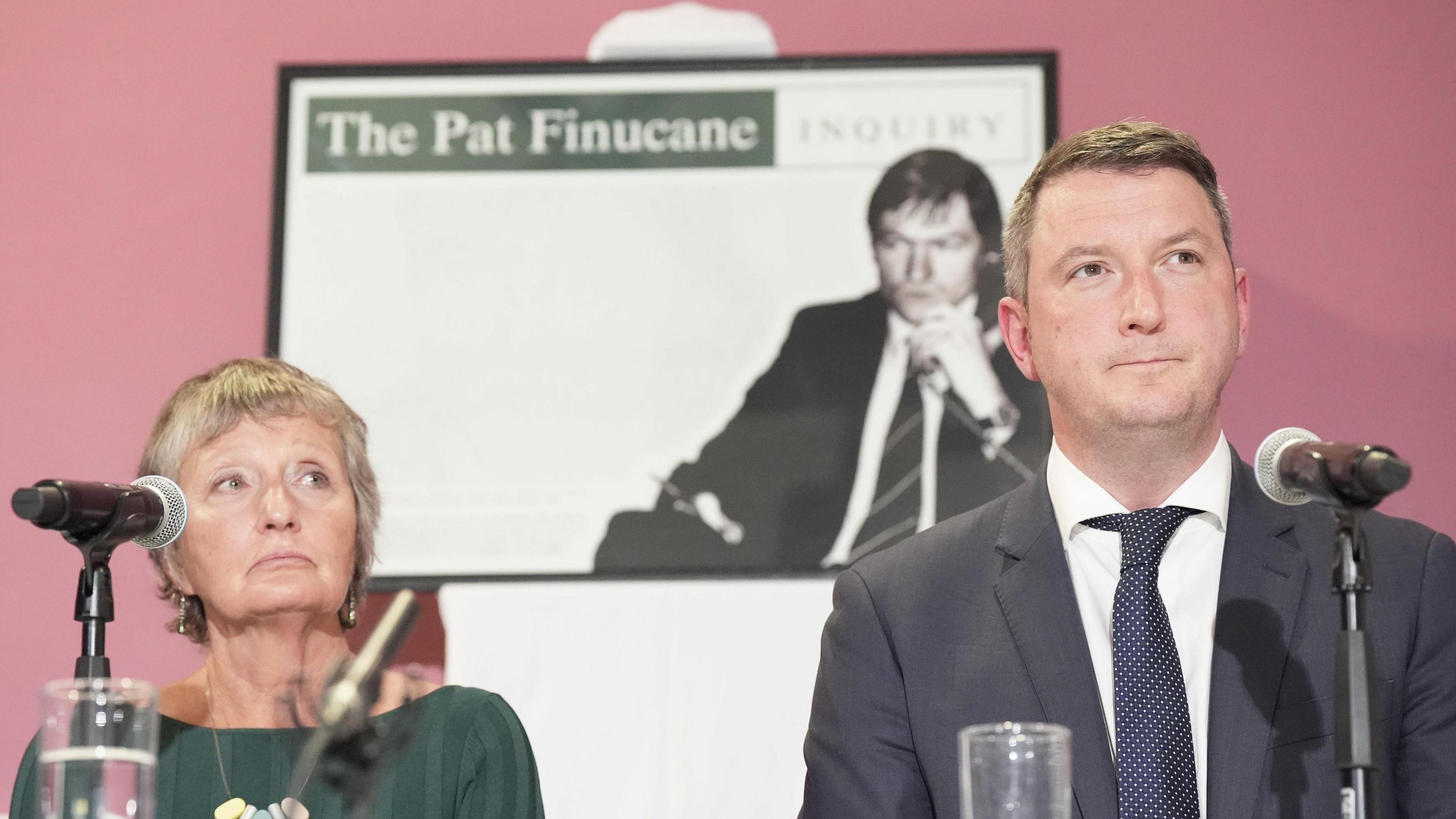
Geraldine Finucane spoke to reporters alongside her son, the MP John Finucane
Speaking at a press conference on Wednesday afternoon, Mrs Finucane said the family did not believe his murder "was simply the act of gunmen" and that they hope to "expose the whole truth behind the murder of my husband".
The widow added she believed a public inquiry could succeed where other investigations had failed because it is a forum with the "ability to get to the truth".
"People can be cross-examined, questions can be verified, facts can be established and an inquiry is the only place for that," she explained.
Referring to previous investigations which were rejected by the family, she said the witnesses "weren’t cross-examined" and in some cases were not questioned at all.
Wiping away tears at some points, Mrs Finucane offered "heartfelt thanks and gratitude" to everyone who had helped the family's campaign.
Their son John Finucane, who is the MP for Belfast North, told reporters that the government's decision to grant the inquiry was a "vindication" of his mother's strength and leadership.
Who was Pat Finucane?
- Published11 September 2024
'Unfulfilled' commitment
Speaking in the Commons on Wednesday, the secretary of state said: "This government takes its human rights obligations and its responsibilities to victims and survivors of the Troubles extremely seriously."
"The plain fact is two decades on the commitment made by the government - first in the agreement with the Irish government, then in this house - to establish an inquiry into the death of Mr Finucane remains unfulfilled," Benn added.
"It is for this exceptional reason I've decided to establish an independent inquiry under the 2005 Inquiries Act."
Benn told MPs he hoped the inquiry would provide the information that the Finucane family had "sought for so long".
He said the government will seek to appoint a chair of the inquiry and establish its terms of reference as soon as possible.
On the point of costs, Benn said he hoped the inquiry could avoid unnecessary costs given previous reviews and investigations as well as the large amount of material already in the public domain.
Hilary Benn announces Pat Finucane inquiry
BBC News NI's crime and justice correspondent Julian O'Neill described the murder as one of the most controversial killings of the Troubles.
Examinations of the case have established that there was collusion, he added, with two state agents within the UDA who were involved.
The Finucane family have long campaigned for a public inquiry to get to the bottom of the full extent of the collusion, he continued, including a claim it went all the way up to the British cabinet.
What has been the political reaction?
The First Minister Michelle O'Neill said she welcomed the "announcement that the Finucane family has secured a public inquiry into the killing of their beloved father and husband".
O'Neill added that she will "continue to support the Finucane family as they continue on their journey towards truth and justice for Pat".
Democratic Unionist Party (DUP) leader Gavin Robinson said the granting of a public inquiry would "heap further hurt on the families who have never had anyone convicted of their loved one’s murder".
He said the murder of Pat Finucane, like all murders in the Troubles, was wrong, but Wednesday's announcement "perpetuates a hierarchy and sends the message that this murder was more deserving of investigation than others".
The Taoiseach (Irish prime minister) Simon Harris welcomed the decision, saying "today is a vindication of Geraldine Finucane and her family who have campaigned over decades for truth and justice".
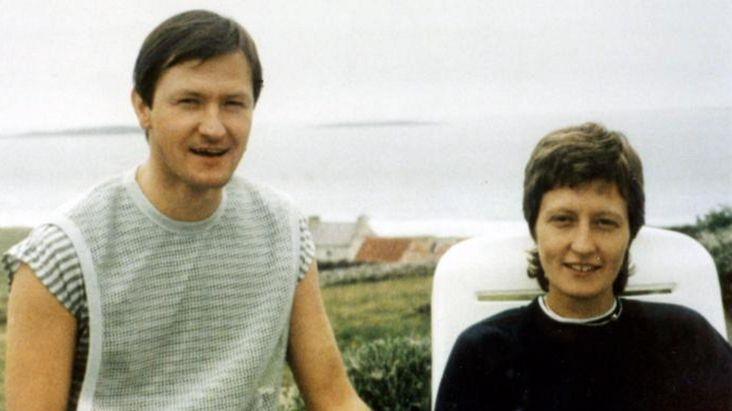
Pat and Geraldine Finucane pictured on holiday
SDLP leader Colum Eastwood also welcomed the announcement, saying he wrote to the Prime Minister Sir Keir Starmer last month urging him to call a public inquiry.
He added: "This must be a turning point for legacy investigations. It should be the moment where we agree to deal with the past comprehensively and ethically."
Traditional Unionist Voice (TUV) leader Jim Allister asked the Commons whether there had ever been a family given more "preferential" treatment.
Jim Allister said the family had received a prime ministerial apology, multiple investigations and now an "uncapped public inquiry".
Speaking in the Commons, Robin Swann from the Ulster Unionist Party (UUP) asked the secretary of state to clarify whether this announcement has "ended any opportunity for other families and loved ones across Northern Ireland who still held out a hope for a public inquiry".
Alliance MLA Nuala McAllister said the the inquiry will "hopefully bring accountability for those involved".
It was "always necessary" in this case, she says, "given the serious public interest issues involved and the government’s acceptance that collusion played a part”.
Responding to the criticism that his family had received preferential treatment, John Finucane said it was " very difficult to square that with the experience that my family have been through for over 35 years”.
Who was Pat Finucane?
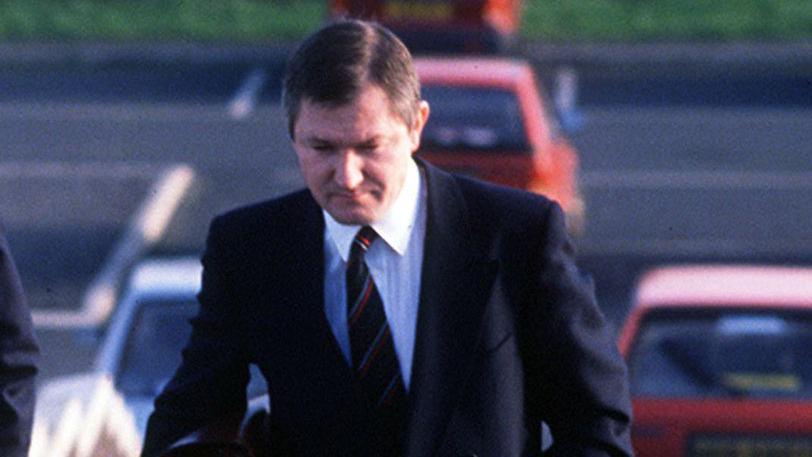
Pat Finucane was a well known defence solicitor who frequently acted for high profile IRA members.
He also represented loyalists in his work.
In February 1989 he was shot 14 times by two gunmen.
His wife, Geraldine, was also wounded.
One of his sons is the Belfast North MP John Finucane, of Sinn Féin.
At an inquest into his death police refuted claims that Mr Finucane was in the IRA.
In 2012, Sir Desmond's report into the murder found there was agent involvement and that police took no action on threat intelligence regarding Mr Finucane.
Other victims 'question resources'
Victims’ campaigner Kenny Donaldson, director of the South East Fermanagh Foundation, said other families who lost loved one during the Troubles would be wondering why the Finucane case has been prioritised again when there has been little or no investigation into so many other Troubles killings.
“The murder of Pat Finucane was entirely wrong and it was without justification” Mr Donaldson told BBC News NI
But, he added: “We’re very conscious that many other victims and survivors are watching events unfold and many are asking that obvious question – the amount of resourcing that has gone into this particular case and they have [seen] very little ever done in regards to their own case.”
Meanwhile the victims' group Relative for Justice praised the family's "tenacious, courageous and unending pursuit of truth and justice".
Related topics
- Published11 September 2024
